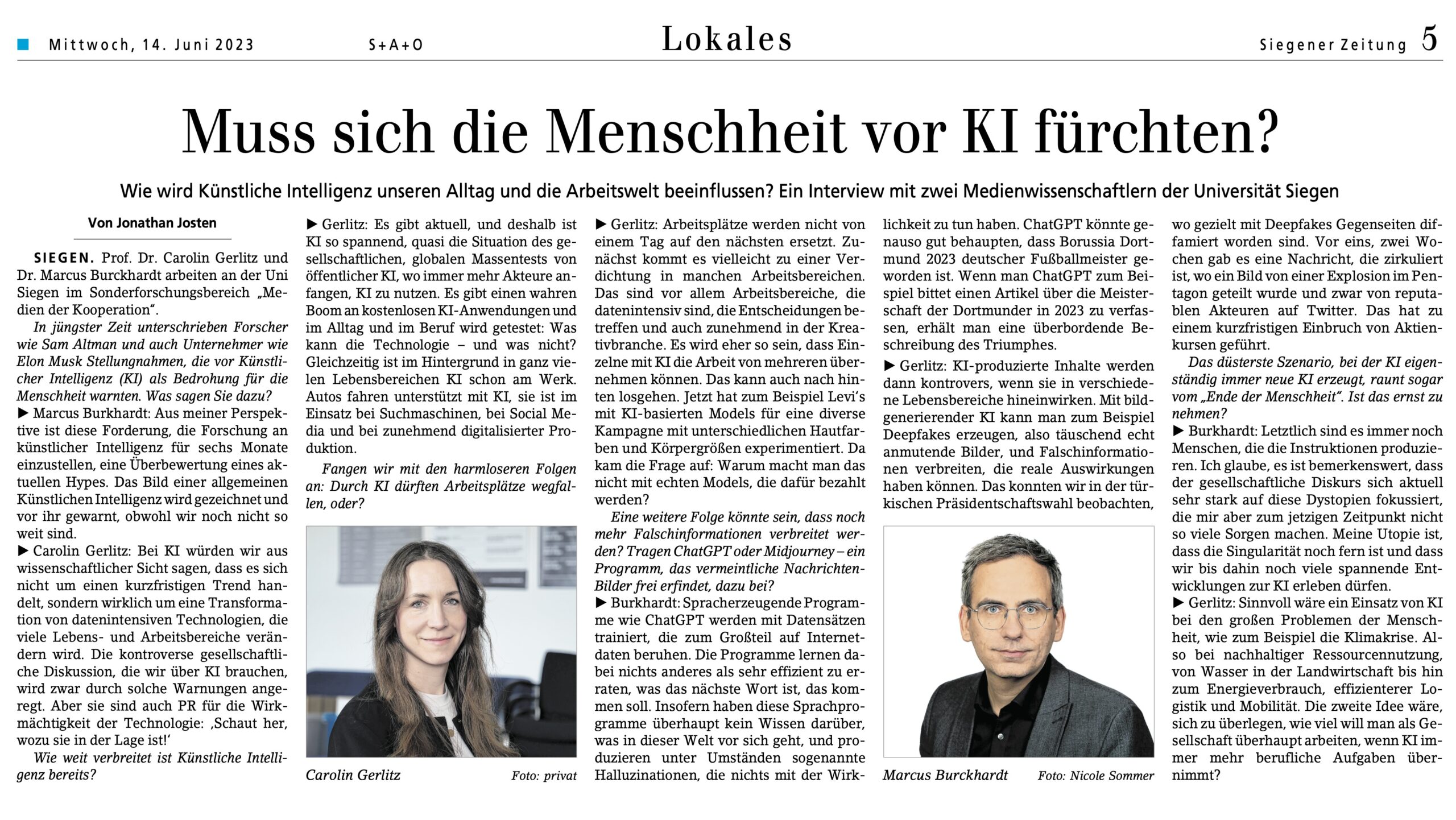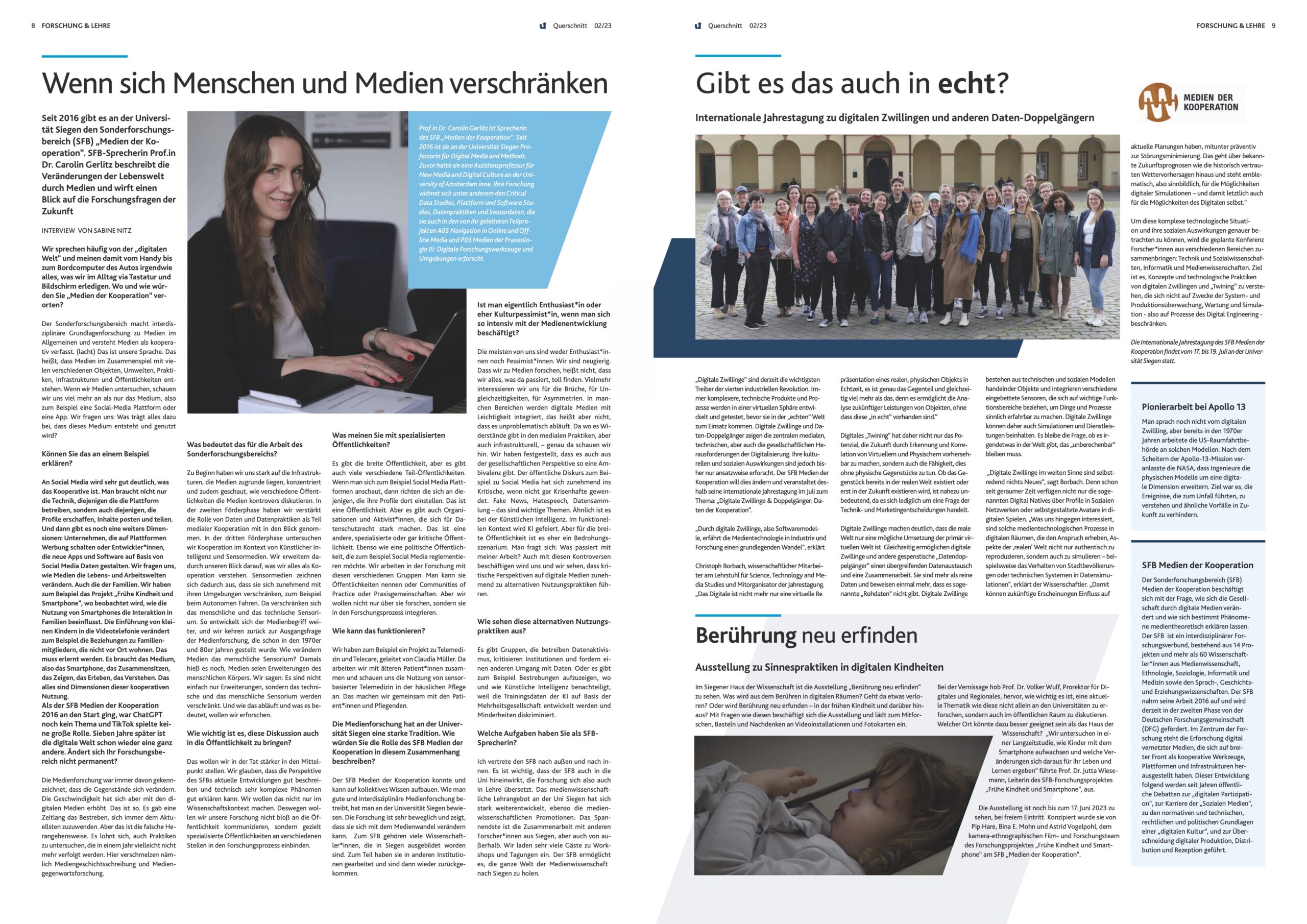News
In an interview with the Siegener Zeitung, Carolin Gerlitz, spokesperson and principal investigator of A03, P03 and MGK, and Marcus Burkhardt, principal investigator of B08, answer how artificial intelligence influences our everyday lives and the world of work.
Die multimodale Internetplattform boasblogs geht am 21. Februar 2023 mit dem Blog „Undoing Race and Racism“ online. Kuratiert von internationalen Wissenschaftler:innen diskutieren Kulturwissenschaftler:innen wöchentlich neueste Perspektiven auf Rassismus, Rassifizierung und Antirassismus. Den Anfang macht die Wissenschaftlerin Katharina Schramm (Uni Bayreuth) mit einem Interview mit Sabelo Ndlovu-Gatsheni, Chair for Epistemologies of the Global South an der Universität Bayreuth. Wie in den anderen boasblogs werden Folgebeiträge immer dienstags hochgeladen.
Auf den boasblogs werden bereits seit 2016 von unabhängigen Redaktionen aktuelle Debatten in eine interdisziplinäre und zunehmend internationale Öffentlichkeit getragen. Der Austausch ist dabei weder auf bestimmte geographische Regionen, noch auf bestimmte Fachdisziplinen beschränkt. Vielmehr wollen die boasblogs als Medium der Kooperation gesellschaftliche Fragen in ihrer politischen, sozialen, akademischen und alltäglichen Relevanz mitgestalten.
So existieren unter anderem bereits Blogs über die Frage der Restitution und Dezentrierung ethnologischer Museen, sowie mehrere Foren, in denen die Corona-Pandemie aus unterschiedlichen Perspektiven beleuchtet wird (Witnessing Corona, Curare Corona Diaries, Fieldwork meets crisis ), aber auch ein Blog zur Umbenennung der Deutschen Gesellschaft für Völkerkunde in Deutsche Gesellschaft für Sozial- und Kulturanthropologie.
Der Name boasblogs geht auf den deutschstämmigen Ethnologen Franz Boas (1858–1942) zurück, der als einer der Begründer der US-amerikanischen Cultural Anthropology gilt und ein ‚Public Anthropologist‘ avant la lettre war. Seine kulturrelativistischen Thesen, nach denen jede Kultur eine eigene Geschichte und Entwicklung ausbilde, die eine Hierarchisierung von Kulturen unmöglich machen, waren Anlass für den ersten boasblog, der den Artikel „Dschungelmärchen“ in der Süddeutschen Zeitung zum Ausgangspunkt nahm, um das Verhältnis von „Kulturrelativismus und Aufklärung“ zu diskutieren.
Im Ausgang dieser Kontroverse haben die boasblogs seither weitere aktuelle kulturwissenschaftliche Themen aufgegriffen, interdisziplinär erweitert und öffentlich gemacht. Dabei werden neueste und niedrigschwellige Formen der multimodalen wissenschaftlichen Kooperation ausgelotet, besonders im internationalen Kontext außerhalb des transatlantischen Wissenschaftsbetriebs. Ausgewählte Diskussionen zu einem bestimmten Thema werden außerdem in Form von boasblogs papers online und in gedruckter Form zur Verfügung gestellt (https://boasblogs.org/papers/).
Die boasblogs sind ein zentraler Bestandteil des Forschungsprogramms des Sonderforschungsbereichs (SFB) 1187 „Medien der Kooperation“. Sie sind bereits in der ersten Förderphase des SFB (2016–2020) aus der Kooperation mit dem Global South Studies Center Köln, der Verbundforschungsplattform Worlds of Contradiction der Universität Bremen und der Zeitschrift für Kulturwissenschaften hervorgegangen.
Herausgeben von Christoph Antweiler (Bonn), Michi Knecht (Bremen), Ehler Voss (Bremen/Siegen) und Martin Zillinger (Köln) werden die boasblogs durch den DFG-Sonderforschungsbereich 1187 „Medien der Kooperation“ der Universität Siegen, der Verbundforschungsplattform Worlds of Contradiction (WoC) an der Universität Bremen, und dem Global South Studies Center der Universität zu Köln (GSSC) finanziert.
Vorschläge für neue Themen und Redaktionsteams sind jederzeit herzlich willkommen.
Kontakt: info[æt]boasblogs.org
Carolin Gerlitz was elected as the new spokesperson for SFB 1187 “Media of Cooperation” back in October. She has been a professor of Digital Media and Methods at the University of Siegen since 2016. Previously, she held a tenured assistant professorship for New Media and Digital Culture at the University of Amsterdam.
Her research focuses on critical data studies, platform and software studies, data practices and sensor data, among others, which she explores in her subprojects A03 Navigation in Online and Offline Media and P03 Media of Praxeology III: Digital Research Tools and Environments, which she leads. In addition, she leads the sub-project C01 Fabricating ‘the people’ Negotiating Claims of Representation in Social Media in Post-Gezi Turkey in CRC 1472 Transformations of the Popular.
As spokesperson, she now replaces Tristan Thielmann in his duties, who will act as deputy spokesperson from now on. We wish Carolin Gerlitz all the best for her new tasks.
Networking, workshops and coaching sessions: As part of equal opportunities service in the CRC we host and offer a variety of formats ranging from networking events, coaching sessions and workshops to a comeback of our “Gender & Diversity Lunch”.
In the past winter, we invited Dr. Claudia Neusüß with a thought-provoking workshop on “Career Development and Negotiation Techniques”, which was the result of a valuable cooperation with the Equal Opportunities Office. Our PhD candidates became part of the supportive “Online Coworking Community” initiated by Dr. Anna Maria Beck and benefitted from an inspiring writing workshop conducted by [schreibzentrum.berlin]. Furthermore, we provided our female members individual coaching sessions on career development.
We started into the summer with a talk and discussion round with Dr. Iuditha Balint, director of the “Fritz-Hüser-Institut für Literatur und Kultur der Arbeitswelt”, which became the kick-off event for this summer’s “Gender & Diversity Lunch” series, formely known as “Gender Lunch”. In the following month we welcomed Jun.-Prof. Dr. Cécile Stehrenberger and are looking forward to our next guests, Prof. Dr. Julia Bee and Dr. Simone Pfeifer, who will share their experiences around the topics of gender equality, diversity as well as reconciling academia and family. The “Gender & Diversity Lunch” is a collaborative format with the CRC 1472 “Transformations of the Popular”. Joining forces, we seek to facilitate networking between CRC members and individuals from variuous fields with different biographical backgrounds.
In June, we were very happy to host the workshop “Critical Whitness – Perspectives and Positioning for Everyday University Life” facilitated by KARFI – Black Collective for Empowerment and Racism-Critical Education. The educational collective is an association of three Black women, offering workshops, lectures, and support on working critically on racism.
We are very much looking forward to learning and growing with, through and from one another.
You find more about our Equal Opportunities Services here.
50 Jahre Universität Siegen, 50 Jahre Forschung. Begleitet von Live-Musik konnten sich Besucher*innen des Fests der „Offene Uni“ am letzten Samstag die Sonderforschungsbereiche 1187 „Medien der Kooperation“ und 1472 „Transformationen des Populären“ der Universität Siegen kennenlernen. Unter dem gemeinsamen Thema „Unsere digitale Gegenwart: neue Formen des Populären und der Kooperation“ gaben vier unserer Teilprojekte im sonnenbeschienenen Hof des Unteren Schlosses Einblick in die Vielfalt der Medien der Kooperation.
Neben dem Gespräch mit unseren Forschenden konnten Besucher*innen mit vergangenen und aktuellen Chatbots interagieren und mehr über die Forschung zu synthetischen Akteuren erfahren, die in unserem Teilprojekts B08 „Agentic Media: Formen der Semi-Autonomie“ erfolgt. Wie viel Alexa mithört und versteht, konnten Besucher*innen wiederum vom Teilprojekt B06 „Un/erbetene Beobachtung in Interaktion: „Intelligente Persönliche Assistenten“ (IPA)“ erfahren. Früh übte es sich beim Stand von Projekt B05, welches die Interaktion von Babys und Kindern zusammen mit den Eltern erforscht. Über kleine Filme und Fotos zeigte das Projekt B05 „Frühe Kindheit und Smartphone. Familiäre Interaktionsordnung, Lernprozesse und Kooperation“, wie Kleinkinder mit digitalen Geräten umgehen. Digitale Medien spielen auch in der Medizin eine wichtige Rolle. Unser Projekt A06 „Visuell integrierte klinische Kooperation“ präsentierte den selbstentwickelten Prototypen, der die Symptome von Bandscheibenproblemen zeigt.
Wir hoffen, dass wir allen Besucher*innen einen Eindruck davon vermitteln konnten, auf welcher breiten Front sich digitale Medien als kooperative Werkzeuge, Plattformen und Infrastrukturen zeigen und danken für das Interesse und die anregenden Gespräche.
The SFB 1187 uploads video recordings of past and upcoming events
Video recordings of past conferences are now available for streaming on our new ‘Media‘ site. The recordings include individual talks and panels from our last year’s International Geomedia Conference “Off the Grid”, contributions from our annual conferences and other international conferences. In addition, you find short project videos wich give insights into the research work our PhD candidates at the integrated graduate school are conducting (MGK). Recordings of future events will be published here as well. Stay tuned.
The first Mixing Methods Summer School of the Collaborative Research Centre (SFB 1187) “Media of Cooperation” took place online from 26 to 30 July 2021 and focused on “Breaching Digital Media / Respecifying Ethnomethodology”. Situated within the intern graduate school (MGK), the Summer School invited Ph.D candidates from the SFB 1187. Based on the concept of “Research Sprints”, the participants not only explored digital media and data practices in a contrastive and project-oriented way using different methods but also reflected upon the limits and possible combinations of different methodological approaches.
The breaching experiments were accompanied by three keynotes from the fields of digital sociology, media studies, and human-computer interaction. Noortje Marres argued for a situational analytics in her talk about “An interpretative methodology for the study of social life in computational settings”, Anne Rawls spoke about “Revealing Order through Disorder: Garfinkel’s Breaching Tutorials and Studies of Difficulty and Difference” and Kristina Lindström and Åsa Ståhl presented recent work from their project “Un/Making Matters, Practices and Imaginaries”. The SFB’s first Mixing Methods Summer School concluded with a joint presentation of the “Breaching” results.
Led by Loup Cellard, one of two facilitators of the Summer School, and Robin de Mourat, the first group with Daniela van Geenen, Stefan Laser, Fernando van der Vlist, Jason Chao and Danny Lämmerhirt examined the fitness app Strava and its tracking conditions for sports activities such as jogging, swimming and cycling. With the use of breaching experiments, they were able to uncover leaks and limitations of the app while revealing its digital functionality. A second research group, consisting of Tim Hector, Niklas Strüber, Yarden Skop, Marcus Burkhardt, Susanne Förster, and Tatjana Seitz, focused on breaching the chatbot Replika, which revealed a number of linguistic inconsistencies, technical problems, and political incorrectnesses. The third research group by Max Kanderske, Hendrik Bender, Regina Wuzella, Benedikt Merkle and Timo Kaerlein, led by Philippe Sormani, the second faciltator of the Summer School, dealt with questions of ethnomethodology. Their breaching focused on the Google AIY Vision Kit and its image recognition software which was pushed to its limits.
The next Mixing Methods Summer School is scheduled for 2023.
How does digitization relate to assistance? A mishap sparked a profound study on contemporary redistribution of assistance at Deutsche Bahn.
When sociology professor Jörg Potthast lost his phone and wallet on a train in 2015, he found himself in the stressful situation of not being able to block his credit card. Without a phone of his own he had to rely on the train conducter’s kindness and contact his bank over a borrowed one. To make matters worse the connection was insufficient. This unfortunate event prompted the author to take a closer look at the lost and found services of the Deutsche Bahn.
Noticing a shift towards digitization within the “lost and found” services of the deutsche Bahn, the author explores the effects that come with digital practices. Leaving the train, the publication “Lost and found: transforming assistance at digital Deutsche Bahn” further contemplates the general digital practices of the individual consumer, when seeking assistance.
The publication intends to seek for a politics of pity – which have been largely absent from the current appraisals of digital sociality – in exploring the ambiguous patterns in the practice of assistance.
Jörg Potthast is a principal investigator at the Collaborative Research Center (SFB 1187) „Media of Cooperation“ in Siegen, leading the project A04 – Normal Interruptions of Service. Structure and Change of Public Infrastructures, which explores the sociological aspects of public transport.
His paper is published as part of the Working Paper Series of the SFB 1187 (No. 19, July 2021) which promotes inter- and transdisciplinary media research and provides an avenue for rapid publication and dissemination of ongoing research located at or associated with the CRC. The purpose of the series is to circulate in-progress research to the wider research community beyond the CRC. All Working Papers are accessible via the website or can be ordered in print by sending an email to: karina.kirsten[æt]uni-siegen.de
4 / 6

